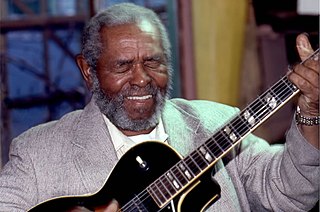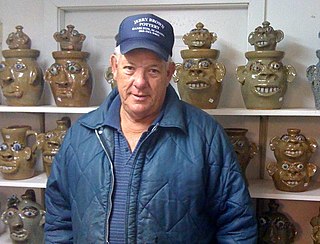
Walter Brown "Brownie" McGhee was an American folk and Piedmont blues singer and guitarist, best known for his collaboration with the harmonica player Sonny Terry.

William Smith Monroe was an American mandolinist, singer, and songwriter who created the bluegrass music genre. Because of this, he is often called the "Father of Bluegrass".

The Dixie Hummingbirds are an influential American gospel music group, spanning more than 80 years from the jubilee quartet style of the 1920s, through the "hard gospel" quartet style of gospel's golden age in the 1940s and 1950s, to the eclectic pop-tinged songs of today. The Hummingbirds inspired a number of imitators, such as Jackie Wilson and James Brown, who adapted the shouting style and enthusiastic showmanship of hard gospel to secular themes to help create soul music in the 1960s.
Ledward Kaapana is a Hawaiian musician, best known for playing in the slack key guitar style. In 2011, he received a National Heritage Fellowship, the United States government's highest honor in the folk and traditional arts. He also plays steel guitar, ukulele, autoharp, and bass guitar, and is a baritone and falsetto vocalist. He received Na Hoku Hanohano Awards from the Hawai'i Academy of Recording Arts (HARA), and has been nominated for Grammy Awards.

The Blind Boys of Alabama, also billed as The Five Blind Boys of Alabama, and Clarence Fountain and the Blind Boys of Alabama, is an American gospel group. The group was founded in 1939 in Talladega, Alabama, and has featured a changing roster of musicians over its history, the majority of whom are or were vision impaired.
The National Heritage Fellowship is a lifetime honor presented to master folk and traditional artists by the National Endowment for the Arts. Similar to Japan's Living National Treasure award, the Fellowship is the United States government's highest honor in the folk and traditional arts. It is a one-time only award and fellows must be living citizens or permanent residents of the United States. Each year, fellowships are presented to between nine and fifteen artists or groups at a ceremony in Washington, D.C.

Mary Elizabeth Jones was an American gospel and folk singer credited with helping to bring folk songs, games and stories to wider audiences in the 20th century. Alan Lomax, who first encountered Jones on a field recording trip in 1959, said, "She was on fire to teach America. In my heart, I call her the Mother Courage of American Black traditions."

Roebuck "Pops" Staples was an American gospel and R&B musician. A "pivotal figure in gospel in the 1960s and 1970s", he was an accomplished songwriter, guitarist and singer. He was the patriarch and member of singing group The Staple Singers, which included his son Pervis and daughters Mavis, Yvonne, and Cleotha.

Michael Louis Doucet is an American singer-songwriter and musician best known as the founder of the Cajun band BeauSoleil.
The Fairfield Four is an American gospel group that has existed for over 100 years, starting as a trio in the Fairfield Baptist Church, Nashville, Tennessee, in 1921. They were designated as National Heritage Fellows in 1989 by the National Endowment for the Arts, which is the United States government's highest honor in the folk and traditional arts. The group won the 1998 Grammy for Best Traditional Soul Gospel Album. As a quintet, they featured briefly in the 2000 movie O Brother, Where Art Thou?.

John Jackson was an American Piedmont blues musician. Music was not his primary activity until his accidental "discovery" by the folklorist Chuck Perdue in the 1960s. Jackson had effectively given up playing in his community in 1949.

Cephas & Wiggins was an American acoustic blues duo, composed of the guitarist John Cephas and the harmonica player Phil Wiggins They were known for playing Piedmont blues.

Jerry Dolyn Brown was an American folk artist and traditional stoneware pottery maker who lived and worked in Hamilton, Alabama. He was a 1992 recipient of a National Heritage Fellowship from the National Endowment for the Arts and a 2003 recipient of the Alabama Folk Heritage Award. His numerous showings included the 1984 Smithsonian Festival of American Folklife with his uncle, potter Gerald Stewart.

Bettye Kimbrell is a master folk artist for quilting, and one of the charter members of the North Jefferson Quilter's Guild in Mount Olive, Alabama.
Joseph L. "Big Joe" Duskin was an American blues and boogie-woogie pianist. He is best known for his debut album, Cincinnati Stomp (1978), and the tracks "Well, Well Baby" and "I Met a Girl Named Martha".

John Dee Holeman was an American Piedmont blues guitarist, singer, and songwriter. His music includes elements of Texas blues, R&B and African-American string-band music. In his younger days he was also known for his proficiency as a buckdancer.

Elder Roma Wilson was an American gospel harmonica player and singer. A clergyman, Wilson discovered he had a degree of notability later in his life, having previously been unaware of interest in his work.
Drink Small is an American soul blues and electric blues guitarist, pianist, singer, and songwriter. He is known as The Blues Doctor and has been influenced by a variety of musical styles including gospel and country music.

Mike Rafferty (1926–2011) was an Irish traditional flute player.
Inez Catalon was an American Creole ballad singer, who was one of the most well-known performers of the genre known as Louisiana "home music". These are a cappella versions of ballads and love songs, drinking songs, game songs, lullabies and waltzes performed by women in the home, passed down from earlier generations to provide entertainment for the family before radio and television existed. Home music is not considered part of the public performance repertoire of Cajun and zydeco music because the songs were sung in the home by women, rather than in the dance halls of southwestern Louisiana which featured almost exclusively male performers.














